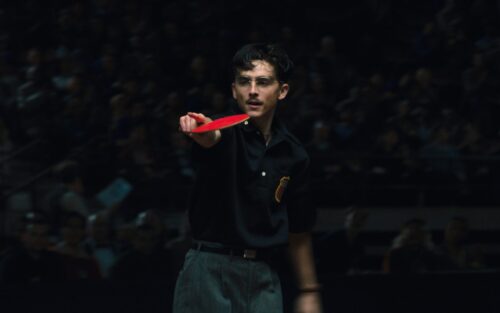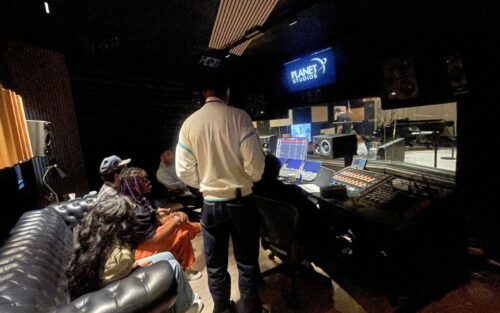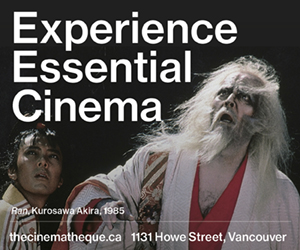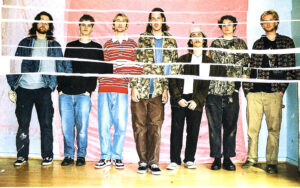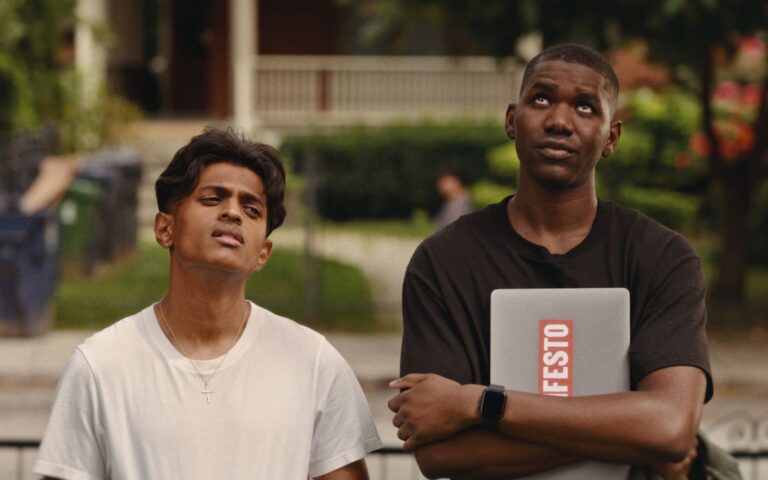
Boxcutter Is the Mixtape Movie Toronto’s Been Waiting For
Shot across the city in a single day, Reza Dahya's debut feature blurs fiction and reality to deliver a uniquely local coming-of-age.
by Adriel Smiley
- Published on
In Boxcutter, director Reza Dahya captures Toronto’s heartbeat through the lens of a struggling rapper on a mission to make it big. The project is a genuine tribute to the city’s music scene and the everyday struggles that accompany artistic ambition. This is not your average music movie.
Boxcutter has become an unintentional dream come true for creatives in Toronto. Formerly a radio host and producer at FLOW 93.5 FM, Dahya’s decade-plus in Toronto’s music industry provides the film with a wealth of authenticity as he crafts a love letter to the city.
Set in Toronto, the story follows an aspiring rapper named Rome—played by Ashton James—who is crippled by insecurity. He learns that megastar producer Richie Hall, played by Rich Kidd, will be making an appearance in Toronto’s Parkdale neighbourhood, and he devises a scheme to get his music to him.
That plan quickly unravels when the only copy of his album is stolen during a burglary at his apartment. With the help of his friend Jenaya (Zoe Lewis), the two race across the city, tracking down his producers to reassemble the project.
The film’s uniqueness becomes even clearer as the story progresses, something that Dahya recognized from the very beginning of pre-production. “We wanted to just not do another normal music film, because we’ve all seen that 1,000 times,” he says. “We have a little tagline on our pitch deck: Conquering their biggest fears starts with the smallest of steps.”
The film captures the essence of Toronto so vividly that at times it feels unreal. A large portion of the soundtrack features Toronto artists, and the movie includes cameos from several memorable faces in the city’s hip-hop and creative arts scenes: RUSSELL!, Clairmont the Second, Junia-T, and Marlon Palmer.

The bulk of the story unfolds over a single day and is predominantly shot outdoors—a creative decision that came with logistical hurdles. The production moved across the city, from Yonge-Dundas Square to Regent Park. “As far as shooting, that was crazy, man, because we can’t control the weather. We’ll show up one day on set, and it’s raining, and it’s like—we don’t have the money to have rain days,” Dahya says. “I was really stressed out and afraid that this whole idea just wasn’t even going to work.”
Boxcutter marked Dahya’s return to directing after several years away from the craft. As he embarked on this project, he knew it would take time to find his rhythm again. “The first few days, I really was having a hard time on set. We were getting through everything, it was fine, but I just internally was feeling really kind of insecure,” he says. “Lost sometimes—like, trying to figure things out. I’m making sure it’s not getting ahead of me or getting away from me, you know? And so I was feeling really down, hard on myself the first few days.”
At the heart of the film is Rome, a character whose dreams, self-doubt, and relationship to his art serve as the emotional core. His fear of being seen, despite his talent, mirrors the inner conflict that many artists grapple with. For Dahya, it also hits close to home. “As I embarked on this artist journey for myself—making films—I’ve experienced this feeling a little bit, too, so I kind of get it. He can’t put out mediocrity, you know? Because he knows he’s part of this legacy, this really powerful thing.”

Dahya is already thinking about where Boxcutter fits within the broader landscape of Canadian film—not from a place of pressure, but of pride. The script took years to develop, and bringing it to life was a formidable challenge. Looking back, the entire process feels surreal. “When I look back, I can’t believe we did that. Like, how did we do this? It’s very surreal. We made this thing—now I just enjoy watching it,” he says. “To go back and think of how much work goes into every film is crazy. I think that’s the biggest part of it—knowing how much work it took. And then being like, I did all that work.”
At its core, Boxcutter is also a meditation on what it means to succeed as a creative in Toronto. The city has produced some of the world’s biggest stars and inspired countless others to chase the dream in their own way. The film offers a grounded look at those aspirations—and how they differ from person to person.
For Dahya, success is about impact and connection, especially within his community. “People who are coming up who don’t know anything about the industry finding this film would be a huge success for me,” he says. “It becoming a film that sticks—that’s all that really matters, the connection. That connection to an audience member is what success is.”
Boxcutter is set to be released in select theatres across Canada on June 13.
By Glenn Alderson
A deep-listening session reveals how Apple Music’s sonic innovation reshapes the way we hear.
By Cam Delisle
Dominic Weintraub and Hugo Williams take audiences on a treadmill-fueled ride through the chaos and hope of modern life.

